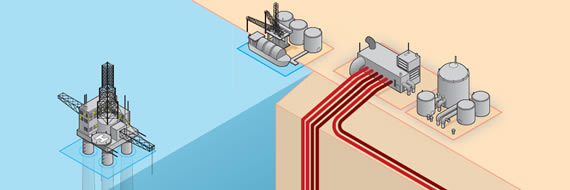Flow Assurance
Noble Offshore has over 10 years experience in flow assurance, carrying out studies for the oil and gas industry worldwide. This is backed by our fundamental research into multiphase phenomenon and our support for joint industry projects .
- Prevention of blockages from hydrates, waxes, asphaltenes and the impact of emulsions.
- Transient multiphase simulations for pipeline sizing and operating envelopes
- Independent screening and selection of oilfield chemicals
- HIPPS and flare/vent modelling providing protection from excessive pressures and high flows
- Surge analysis and slugcatcher sizing
- Thermal behaviour of flowlines including pipeline insulation and active heating.
This could be applied to:
- New or extended subsea pipelines
- New or extended offshore developments
- Change of pipeline use Troubleshooting operational pipelines
Subsea tiebacks
Tools
OLGA from SPT Group is the market leading simulator for transient multiphase flow of oil, water and gas in wells and pipelines. Many aspects of multiphase flow, such as slugging, are dynamic phenomena and require the transient capability of OLGA to allow their prediction.
HYSYS is a simulation package from AspenTech that can be used for plant design, performance monitoring, troubleshooting, operational improvement and asset management. HYSYS includes a databank of over 18,000 components and all the industry standard equations of state.
PIPESYS from Neotechnology Consultants Ltd is an extension to HYSYS which gives the capability to model single and multiphase flow in pipelines and can be used to calculate pressure, temperature and hold-up profiles.
WaxPro is a steady state thermodynamic simulation tool developed by the Tulsa University Paraffin Deposition joint industry project. It is used in the investigation of wax deposition and wax prevention techniques in single and multiphase pipelines.
Multiflash from Infochem can perform multiphase equilibrium calculations between a number of phases of different types. The phases that can be modelled include gases, liquids and solids such as hydrates, waxes and asphaltenes.
GasVLe and OilVLe have been developed byNoble Offshore for calculating physiochemical properties of fluids. These software packages are used to generate thermodynamic data to predict phase behaviour and properties of both simple and complex hydrocarbon based mixtures over a wide range of temperature and pressure.
NETFLO is Noble Offshore’s in-house internal corrosion simulator that is used to identify the location and severity of corrosion in multiphase systems. Calculation of water condensation rates allows top of the line corrosion risk to be assessed.
Independent Chemical Screening
Noble Offshore provides independent screening and selection of oilfield chemicals for:
- Hydrate and wax prevention and remediation
- Scale prevention
- Topsides demuslification
- Corrosion inhibition
- SRB control
Leading edge software tools are used to assess the likelihood of solids deposition. Industry standard and state of the art experimental techniques are then used to evaluate chemical performance under realistic conditions. Our selection process includes:
- Providing a chemical specification document for each application
- Environmental impact screening
- Chemical Performance evaluation
- Compatibility testing of chemicals from different suppliers.
For Hydrates testing Noble Offshore uses a range of laboratory equipment, capable of operating at -6°C to 80°C and up to 200 bar, with visual observation, stirrer torque measurements and laser particle sizing imagery to understand the kinetics of hydrate inhibition. This understanding has been used to develop a kinetic model of hydrate formation and is used in the selection of appropriate treatment options. New multiple test cells allow rapid screening and testing of inhibitor performance.
Noble Offshore combines measurement of wax appearance and experimental data to model wax deposition in production facilities. We can then assess the cost effectiveness of the various mitigation options
including:
- Pipeline insulation
- Heating Chemical treatments
Advanced corrosion predictions are needed to calculate corrosion rates in subsea export pipelines. Noble Offshore uses NETFLO to provide corrosion rate predictions because the effects of flow pattern behaviour are included in the calculations. A correctly specified inhibitor testing programme for corrosion control is then applied.
Lloyd Alamn provides an independent corrosion inhibitor selection and testing service for both sweet and sour conditions. In multiphase systems production chemicals, especially corrosion inhibitors, can promote stable emulsion formation. Interaction between various chemical mixtures can also have an adverse effect on performance. As an independent, Noble Offshore can address the compatibility of products from different suppliers. Demulsifiers can be screened at representative process conditions.
Noble Offshore’s independent selection of a production chemical package for a North Sea development has:
- Saved an estimated £1.5 million on OPEX costs
- Reduced the risk of lost production due to flowline blockage or corrosion
- Saved an estimated £300,000 pa on well intervention costs
